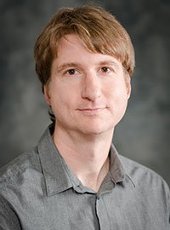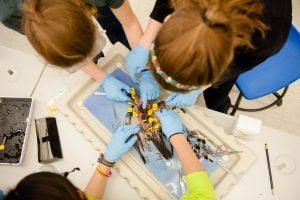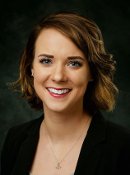Michigan Technological University’s transdisciplinary researchers reach across disciplines and institutional boundaries to solve complex problems that are bigger than a single specialized field.
Kelly Steelman, an assistant professor of cognitive & learning sciences, says diversity is good for problem-solving. If you only have a spoon, the only food you’ll want to eat is soup.
“The more tools you have available to your research team, the more likely you are to consider a variety of solutions and not get stuck always trying to use the same approach to every problem… The more perspectives we bring to the table, the better opportunity we have to create innovative and transformative solutions.”
Read the full story on the Michigan Tech News Website.
Eric Vasey (CS) presented a research paper, “Development and usability testing of a remote control app for an interactive robot” in the Computer Systems Technical Group and Maryam FakhrHosseini (CLS) presented “Robot theater with children for STEAM education” in the Children’s Issues Technical Group.
 Myounghoon (Philart) Jeon (CLS/CS) and his three graduate students are attending the Human Factors and Ergonomics Society 2017 International Annual Meeting, which began October 9-13th, in Austin, Texas.
Myounghoon (Philart) Jeon (CLS/CS) and his three graduate students are attending the Human Factors and Ergonomics Society 2017 International Annual Meeting, which began October 9-13th, in Austin, Texas.
In addition, Jeon attended the International ACM Conference on Automotive User Interfaces and Interactive Vehicular Applications, held in Oldenburg, Germany, Sept 24-27th. For this year’s conference, Jeon chaired the video program, served as the international panel for the student doctoral colloquium, co-organized the Workshop on User-Centered Design for Automated Driving Systems and served as a chair for the Automated Driving session.
Jeon also presented two work-in-progress papers and one video at the conference:
- “Blueprint of the Auditory Interactions in Automated Vehicles: Report on the Workshop and Tutorial”
- “Eyes-free In-vehicle Air Gesture Controls: Auditory-only Displays Reduced Visual Distraction and Workload”
- “Design Process of Sonically-enhanced Air Gesture Controls in Vehicles”
 Adam Feltz has co-authored an article “The Means/Side-Effect Distinction in Moral Cognition” which was accepted for publication in the journal Cognition.
Adam Feltz has co-authored an article “The Means/Side-Effect Distinction in Moral Cognition” which was accepted for publication in the journal Cognition.

Michigan Tech is inviting K-12 teachers and administrators to a workshop in August, to help them find ways to bring computer science and programming into their classrooms. The workshop, supported through a Google CS4HS (Computer Science for High Schools) grant, exposes teachers to exciting new ways to bring computer science into schools.
This is the third year Google has supported a computer science workshop at Michigan Tech for teachers.
“As computer technology becomes an ever more powerful and pervasive factor in our world, students need instruction in the creative problem-solving skills that are the basis of computer science,” explains Linda Ott, (CS) director of the workshop.
“Software design and programming skills, along with an understanding of the principles of computer systems and applications, are tremendously valuable in a wide range of future careers, and the problem-solving process of computational thinking can be used to enrich a wide range of K-12 courses. New tools and teaching materials make it possible to bring the creative spirit of computing into K-12 classrooms.
“From a teacher’s perspective, however, bringing computer science into the classroom can seem intimidating,” Ott goes on to say.
“We want to help teachers develop confidence in their own computer science literacy and help them craft a computing curriculum that meets their teaching missions.”
The workshop will cover a basic understanding of computer science principles, help teachers integrate programming into new and existing courses, disseminate K-12 computer programing course materials developed at Michigan Tech and provide tools for increasing interest in computing among young women.
Participants will receive lunches, a stipend to help with travel and other expenses, and a year of assistance in course development from a Michigan Tech computer science graduate student. Out-of-town teachers will receive free accommodation at the Magnuson Franklin Square Inn.
For more information or to apply, click here.
 Registration is open for 2017 Summer Science Camps at Michigan Tech’s Great Lakes Research Center and Nara Nature Center.
Registration is open for 2017 Summer Science Camps at Michigan Tech’s Great Lakes Research Center and Nara Nature Center.
There are three-day Summer Science Camps for students entering grades 1-5.
Three sessions are offered, and students may enroll for more than one. Camps begin June 13.
 Find out what teams are doing. Many are partnered with Michigan Tech faculty and departments, including CEE, SFRES, etc.
Find out what teams are doing. Many are partnered with Michigan Tech faculty and departments, including CEE, SFRES, etc.
The public is invited to attend one of these upcoming LSSI-sponsored community events. Contact Joan Chadde or the lead teacher for more information or directions.
- 9 a.m. – 2 p.m. June 1-2. Houghton High School – School Forest Research Project Presentations in high school auditorium. (Lauri Davis, lead teacher)
- Noon to 2 p.m. June 2, Washington Middle School, Calumet Township Park (Darrell Hendrickson, lead teacher).
- 6 to 7:30 p.m. June 5, Baraga Middle/High School outside the school building. Fun Run, Veggie Kabobs, Garden/Greenhouse Tours. (Lori Wisniewski and Ben Johnston, lead teachers.
Kudos to all the great stewardship work going on and the hard work of LSSI teachers to provide a rich learning environment for their students.
 Applied Cognitive Science & Human Factors student Madeline Peabody will defend on Friday, March 31 from 12:00 pm to 1:00 pm in Meese Center 109. Her advisor is Elizabeth Veinott.
Applied Cognitive Science & Human Factors student Madeline Peabody will defend on Friday, March 31 from 12:00 pm to 1:00 pm in Meese Center 109. Her advisor is Elizabeth Veinott.
Title: Improving Planning: Quantitative Evaluation of a Premortem in Field and Laboratory Settings
Abstract: Planning can be difficult and developing techniques for evaluating plans has been limited. This thesis compares different plan evaluation techniques in a series of experiments.
The main techniques discussed are the Premortem Method and Worst-Case Scenario Method. The Premortem plan evaluation method can help people reduce overconfidence and generate more reasons a plan might not succeed. Only one experiment has validated this technique; therefore, one goal of the present series of experiments is to qualitatively and quantitatively examine the effectiveness of the Premortem Method in several different planning situations.
This research evaluates the extension of the Premortem to shorter planning time periods, evaluates the effectiveness with team generated and executed plans, and compares the use of this technique among individuals and teams. In Experiment 1, 52 Army Cadets operating in teams completed six time-constrained field exercises that required planning, half using the Premortem and half using a standard Military plan evaluation process. Compared to a control condition, when teams used the Premortem they had fewer fouls and less fixation with no change in execution time. In Experiment 2, 72 individual participants from university organizations used the Premortem Method or Worst-Case Scenario Method to evaluate their group’s plan for an engineering task.
Results from Experiment 2 indicated that there was no statistically significant difference in the number of reasons and solutions generated between methods. To further examine the relative effectiveness of these two plan evaluation methods, and the influence of group dynamics, Experiment 3 compared the efficacy of the Premortem and Worst-Case Scenario Method among groups and individuals in face-to-face settings with a complex and unfamiliar plan. Eighty-two participants generated more reasons with the Premortem Method than the Worst Case Scenario Method, and groups generated more solutions than individuals did.
Overall, the participants in groups using the Premortem Method produced more reasons and solutions than participants using the Worst-Case Scenario Method and individual participants using the Premortem Method. These studies extend prior work by validating that the Premortem is effective in short planning horizons, demonstrating that it works for individuals and teams, and clarifying potential boundary conditions. This research advocates several directions for future research, and suggests possibility of future implementation as a virtual tool or application.
 The Department of Cognitive and Learning Sciences and the William G. Jackson Center for Teaching and Learning (CTL) have developed a new course entitled “Foundations of Online Teaching.” Beginning in Spring 2018, it will be offered in spring and summer semesters as ED5101, but this summer, it will be offered during Track A as a special topics (ED5540) section with the same name.
The Department of Cognitive and Learning Sciences and the William G. Jackson Center for Teaching and Learning (CTL) have developed a new course entitled “Foundations of Online Teaching.” Beginning in Spring 2018, it will be offered in spring and summer semesters as ED5101, but this summer, it will be offered during Track A as a special topics (ED5540) section with the same name.
In order to promote best practices in online teaching, the CTL has been authorized to annually provide $500 in additional compensation to up to 20 faculty members and GTAs who enroll in this course to improve their online instruction. Full-time faculty must enroll in the course as normal and may refer to the Employee Education Program or tuition reimbursement information. GTAs or part-time faculty would need to enroll in the course as a normal one credit class.
All participants wishing to receive compensation must, no later than the end of the first week of the course, provide communication from the appropriate chair or dean indicating their involvement in online teaching within their unit (should the compensation limits be reached, the time of receipt of this letter will determine priority). Individuals must also complete the course with a B grade or better before receiving the additional compensation.
In addition, those completing the course (or who can show equivalent education/experience) will become exclusively eligible for additional grant money (beginning late Summer 2017) to support the development or revision of online courses.
Funding for this program comes from the Online Learning Technology Fee through a cooperative effort between Information Technology and the CTL. Questions about Michigan Tech’s Employee Education Program can be directed to Benefits Services. Questions about the course or the $500 in additional compensation can be directed to Tom Freeman.
